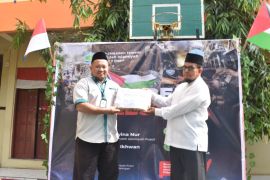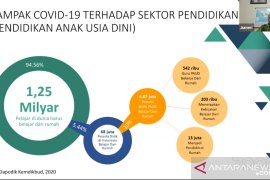"This doormat can inhibit the growth of bacteria, especially Escherichia coli and Staphylococcus aureus," Naufal Bayu Prasetyo, a member of the team that invented the product, said here on Monday.
Nuafal and his two friends, Laila Fitriyani and Tiana Rafmiwati, are students of the Department of Industrial Technology of Agriculture, the Faculty of Agricultural Technology.
According to Naufal, the doormat has advantages that no other mat commonly sold in the market has. The antibacterial doormat contains flavonaid, tannin, alcohol and pennyquinone.
"The mat is able to absorb water moisture and odor," he pointed out.
Naufal explained that bamboo is used to make the doormat because the material is found in abundance in Indonesia and is used in construction.
Once the construction is over, bamboo waste is not put to any use. "With some effort, we can turn this waste into a high value product," he explained.
In the future, the team will qualitatively improve the antibacterial mat so that it has a higher resistance to various types of other microbes also, apart from the two aforesaid kinds of bacteria.
Naufal added that a paper on the antibacterial mat received an award as the Best Session Paper in the 5th International Conference on Agriculture, Environment and Biological Sciences (ICAEBS-16), organized by the International Academy of Arts, Science and Technology in Pattaya, Thailand in April 2016.
Leading scientists, academics and international researchers had participated in the event and presented their ideas about solving various problems in the fields of agriculture, environment and biological sciences.
"We had presented a paper, entitled Utilization of Bamboo (Gigantochloa apus) for Anti-Bacterial Mat as Fiber-Based Prospective Products. We achieved the best paper award," he narrated.(*)
Editor: Heru Purwanto
Copyright © ANTARA 2016











